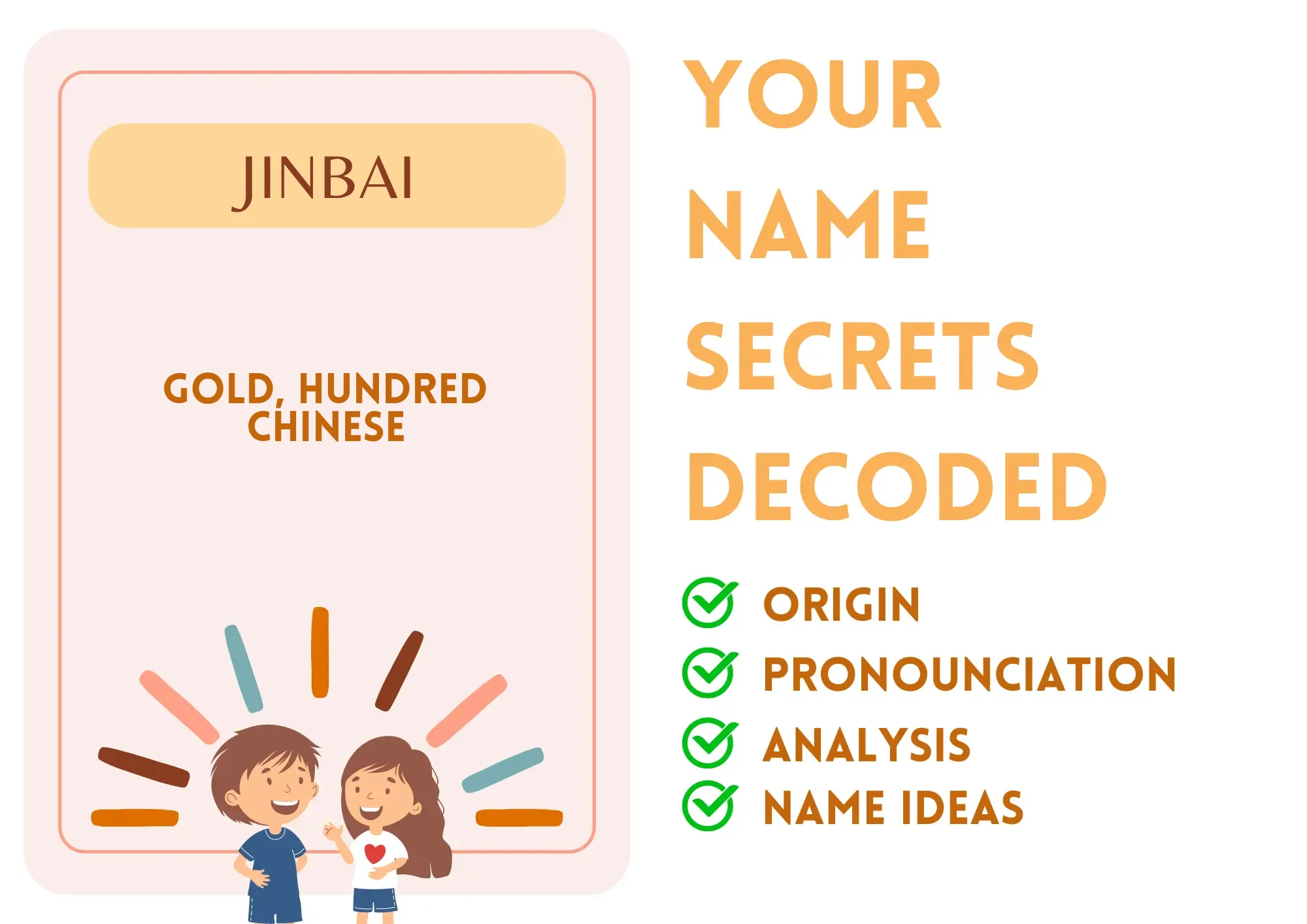
Jinbai
Jinbai is a unique name with East Asian roots, particularly Chinese, where it conveys the meanings of 'gold' (金) and 'hundred' (百) when broken into its components. It is typically used as a masculine name, though it can be adopted as unisex in some contexts. In Chinese culture, associated symbols like wealth and abundance are often tied to this name, making it a desirable choice for parents looking to bestow monetary fortune and prosperity upon their child.
The name Jinbai is perceived with warmth and positivity, reflecting the hopes and dreams parents have for their children's future. It is straightforward to write and pronounce, contributing to its appeal.
Given its rarity, Jinbai stands out in popular culture and is mostly associated with various fictional creations in literature and media. The name is cherished for its cultural richness and encapsulates the ideals of wealth and happiness in familial and societal contexts.
Basic Information
Gender: Unisex
Sounds Like: JEEN-bye
Pronunciation Explanation: The first syllable 'JIN' rhymes with 'tin' and the second syllable 'bai' sounds like 'bye.'
Summary and Meaning
Meaning: gold, hundred (Chinese)
Origin: The name Jinbai originates from Chinese culture and language, enriched by thousands of years of history and significance.
Usage: Traditionally, Jinbai is considered a masculine name but is sometimes used as unisex.
Name Number (Chaldean)
Name Number (Pythagorean)
Popularity (Global Rank)
Overall: 1327923
Boys: 72681
Girls:
Most Popular in
Religious and Cultural Significance
Religion: Buddhism
Background: In Buddhist contexts, names like Jinbai symbolize abundance and good fortune, often linked to cultural beliefs advocating prosperity.
Cultural Significance: Jinbai enjoys popularity due to its auspicious meanings, making it a favored choice for families within Chinese communities wishing for luck and wealth.
Historical Significance: Historically, names like Jinbai are rooted deeply in traditional beliefs surrounding wealth and prosperity within Chinese culture, reflecting ancient values around thriving and well-being.
Popular Culture
Literature and Mythology: Jinbai is not frequently featured in classical literature but may appear in modern storytelling as a character symbolizing success or wealth.
Movies and Television: Occasionally, characters named Jinbai can be found in East Asian cinema, often embodying themes of wealth or success.
Feelings and Perceptions
Perception: Jinbai is generally viewed positively, conveying hopefulness and aspirations for wealth and abundance. It stands out as unique.
Positive Feelings: Auspicious, elegant, unique, hopeful, prosperous.
Negative Feelings: Some may find it challenging due to unfamiliarity with the name.
Practical Considerations
Ease of Writing and Calling: Jinbai is relatively easy to write and pronounce, comprising six letters and two syllables, making it memorable and easy to call.
Common Typos and Misspellings: Jinbei,Jinbay,Jinbi,Jimbai
Common Nicknames: Jin,Bai,Jinny
Jinbai Popularity
Jinbai Usage and Popularity By Country
| Country | Rank (Overall) |
|---|---|
| United States | 344452 |
Jinbai Usage and Popularity By City
| City | Rank (Overall) |
|---|
Compatibility Analysis
Famous Persons Named Jinbai
No results found for Jinbai.
Related Names
Similar Sounding Names:
Junpei,Jinwei,Jinju,Jinbiao